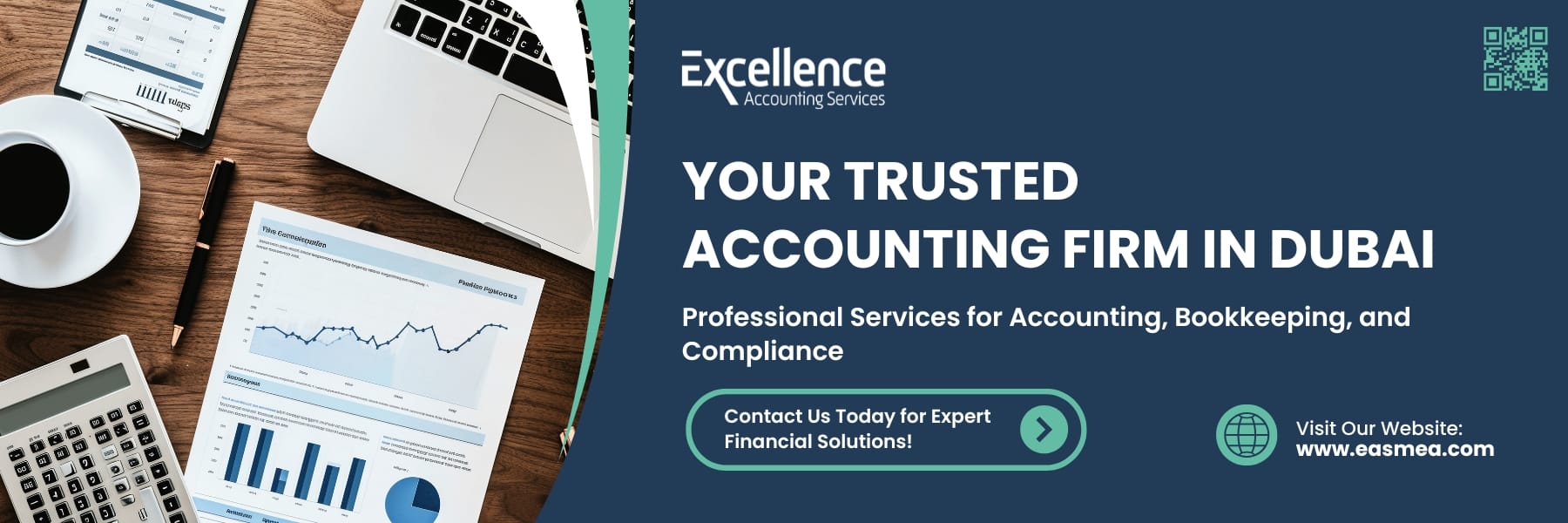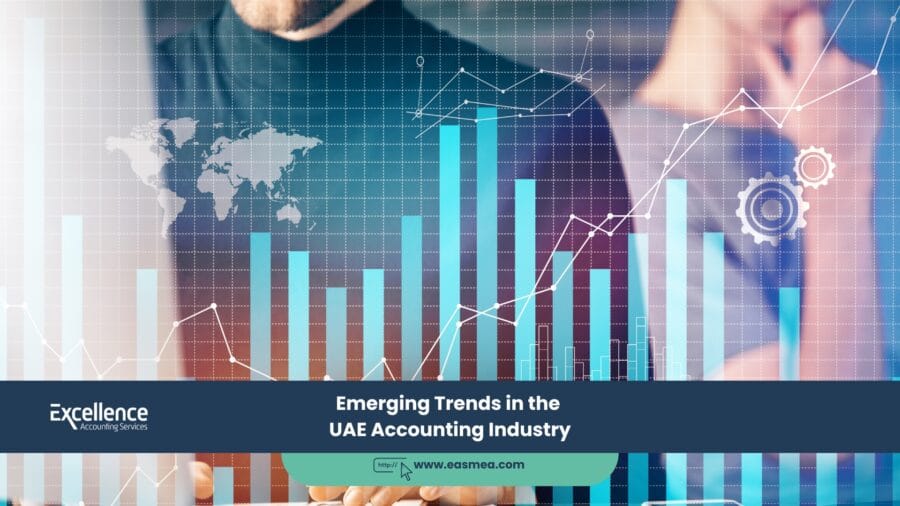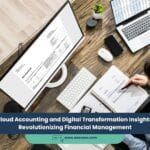The accounting industry in the UAE is undergoing a transformative phase, shaped by rapid advancements in technology, evolving regulatory frameworks, and the diverse demands of modern businesses.
As the country solidifies its position as a global business hub, accounting professionals are increasingly leveraging digital tools, embracing sustainability practices, and adapting to new tax and compliance requirements to meet the growing need for innovative and adaptive solutions.
This evolution is empowering businesses to enhance efficiency, ensure compliance, and drive sustainable growth in an ever-changing economic landscape.
In this blog, we’ll dive deep into the emerging trends revolutionizing the accounting industry in the UAE. From digital transformation and sustainability practices to adapting to new tax regulations and embracing data security, we’ll discuss their profound implications for businesses and share actionable strategies to help you stay competitive in this dynamic market.

1. Digital Transformation in Accounting
The Integration of Big Data Analytics
Big Data analytics is transforming the accounting landscape by enabling businesses to make data-driven decisions. Through the analysis of large datasets, accountants can uncover hidden patterns, optimize financial strategies, and provide predictive insights that are invaluable for business planning.
Example: A UAE-based logistics company leveraged big data analytics to identify inefficiencies in its supply chain. By analyzing transportation costs, delivery times, and customer feedback, the company reduced expenses by 20% and improved on-time delivery rates.
| Benefits of Big Data in Accounting | Description |
|---|---|
| Improved Decision-Making | Offers detailed insights into financial and operational trends, enabling proactive strategies. |
| Enhanced Forecasting Accuracy | Analyzes historical and real-time data to create reliable financial projections. |
| Cost Optimization | Identifies inefficiencies across operations, enabling better resource allocation and savings. |
| Risk Mitigation | Detects potential financial risks early, allowing businesses to implement preventative measures. |
| Personalized Financial Insights | Customizes reports and dashboards to address specific business needs and goals. |
By integrating Big Data analytics, accountants in the UAE can provide businesses with deeper financial insights, streamline operations, and contribute to sustainable growth.
Big Data is playing an increasingly crucial role in the accounting industry. By analyzing large datasets, accountants can uncover trends, improve forecasting accuracy, and provide actionable insights for strategic decision-making.
Example: A retail chain in the UAE used big data analytics to analyze customer spending patterns, enabling more precise financial planning and inventory management.
| Benefits of Big Data in Accounting | Description |
| Improved Decision-Making | Offers detailed insights into financial and operational trends. |
| Enhanced Forecasting Accuracy | Analyzes past data to create more reliable financial projections. |
| Cost Optimization | Identifies inefficiencies and opportunities for cost-saving measures. |
The Growing Role of Blockchain Technology
Blockchain is reshaping the accounting industry by offering unparalleled transparency, security, and efficiency in financial record-keeping. This distributed ledger technology ensures that transactions are immutable and verifiable, fostering trust among stakeholders and streamlining accounting processes.
Example: A multinational company in Dubai integrated blockchain into its supply chain finance system. This move reduced reconciliation times by 50% and provided real-time visibility into financial transactions, significantly improving operational efficiency and stakeholder confidence.
| Benefits of Blockchain in Accounting | Description |
| Enhanced Transparency | Creates a tamper-proof record of all financial transactions, building stakeholder trust. |
| Increased Efficiency | Automates reconciliation and verification processes, saving time and resources. |
| Improved Fraud Detection | Identifies irregularities and prevents fraudulent activities with secure, traceable records. |
| Real-Time Updates | Provides instant access to transaction statuses, improving decision-making capabilities. |
| Cost Savings | Reduces administrative overheads by minimizing manual reconciliation tasks. |
Cloud Accounting
The adoption of cloud-based accounting software is revolutionizing the way businesses manage their finances. Platforms like QuickBooks Online, Xero, and Zoho Books enable real-time access to financial data, seamless collaboration between accountants and clients, and automated reporting features. Businesses are now able to streamline financial processes and enhance decision-making through this technology.
Example: A Dubai-based SME reduced its bookkeeping time by 30% after transitioning to cloud accounting, enabling the team to focus on strategic decision-making and customer engagement. This shift also allowed for real-time financial monitoring, making it easier to identify and act on revenue opportunities.
| Benefits of Cloud Accounting | Description |
|---|---|
| Real-time Data Access | Enables decision-makers to review finances anytime, anywhere. |
| Enhanced Collaboration | Facilitates easy sharing of financial information with accountants. |
| Automation of Tasks | Reduces manual entry errors and streamlines recurring processes. |
| Cost Savings | Eliminates the need for extensive hardware and reduces software maintenance costs. |
| Scalability | Grows with the business, accommodating increasing data and transactions. |
Cloud accounting is not just a trend but a long-term solution for businesses looking to stay competitive in the modern financial landscape. With its user-friendly interfaces and adaptability, cloud accounting empowers businesses of all sizes to manage their finances more effectively.
In addition to cost savings and operational efficiency, cloud accounting also offers advanced analytics capabilities. These analytics provide businesses with insights into spending patterns, cash flow trends, and areas for potential investment. Furthermore, integration with other digital tools, such as CRM systems and payment gateways, amplifies the benefits of cloud-based solutions.
Highlight: Accounting teams report a 40% improvement in efficiency when using cloud platforms that integrate seamlessly with their operational tools. By adopting these solutions, businesses can reduce financial errors, ensure compliance, and focus on growth-oriented initiatives.
2. Emphasis on Sustainability Accounting
Sustainability is becoming a core focus for businesses worldwide, and the UAE is no exception. Sustainability accounting involves measuring and reporting a company’s environmental, social, and governance (ESG) impact alongside its financial performance. This approach helps businesses align with global environmental standards, enhance their reputation, and attract investors who prioritize responsible practices.
Example
A renewable energy firm in Abu Dhabi implemented ESG accounting to attract environmentally conscious investors and partners. By accurately measuring its carbon footprint and showcasing initiatives to reduce emissions, the company secured a significant investment from an international green fund.
| Key Metrics in Sustainability Accounting | Importance |
| Carbon Footprint | Tracks environmental impact, helping in compliance and reducing emissions. |
| Social Responsibility | Demonstrates a company’s commitment to employee well-being and community welfare. |
| Governance Practices | Ensures ethical decision-making, transparency, and adherence to regulations. |
| Resource Efficiency | Tracks energy and material usage to identify cost-saving and sustainable solutions. |
| Diversity and Inclusion | Highlights efforts to create an equitable and inclusive workplace environment. |
Why Sustainability Accounting Matters
Adopting sustainability accounting is not just about compliance; it’s a strategic move. Businesses that actively monitor and report ESG metrics can:
- Attract Investors: Many investors now prioritize ESG-compliant companies.
- Enhance Brand Value: Demonstrating a commitment to sustainability builds trust and loyalty among customers and stakeholders.
- Identify Cost Savings: Monitoring resource usage often reveals inefficiencies that can be corrected for cost reduction.
- Ensure Long-Term Viability: Sustainable practices align with global trends, ensuring resilience in a rapidly changing business landscape.
In the UAE, where the government is heavily investing in sustainability initiatives like the UAE Net Zero by 2050 strategic initiative, businesses aligning with these goals gain a competitive edge and contribute to a sustainable future.
3. Adapting to Regulatory Changes
Corporate Tax Implementation
The UAE’s introduction of corporate tax for businesses with profits exceeding AED 375,000 marks a significant regulatory shift. Accountants play a critical role in helping companies understand the implications, develop tailored strategies, and optimize their financial frameworks for compliance and efficiency.
Example: A manufacturing firm in Sharjah partnered with a professional accounting firm to navigate the corporate tax landscape. The accounting team conducted an in-depth review of the firm’s financial records, identified areas eligible for tax deductions, and implemented a strategy to defer non-essential capital expenses. As a result, the firm achieved a 20% reduction in tax liabilities and streamlined its financial reporting processes.
“Strategic tax planning not only ensures compliance but also unlocks opportunities for reinvestment, driving long-term business sustainability.”
Corporate tax implementation requires a proactive approach, with businesses leveraging professional accounting expertise to align their operations with regulatory requirements while maximizing cost-saving opportunities.
VAT Compliance Evolution
Since the implementation of VAT in 2018, businesses in the UAE have encountered continually evolving compliance requirements. These changes demand vigilance and adaptability from businesses to ensure adherence to regulations while optimizing financial efficiency. Accounting firms are at the forefront of these developments, adopting advanced VAT software and leveraging their expertise to provide robust solutions for their clients.
Example: A retail business in Dubai struggled with the complexities of VAT filing and documentation, leading to repeated penalties. After partnering with an experienced accounting firm, the business implemented automated VAT software, significantly reducing errors and identifying eligible refunds worth AED 150,000. This not only improved cash flow but also enhanced the business’s confidence in managing tax obligations.
| Key Benefits of Advanced VAT Solutions | Description |
| Precision in Filings | Minimizes errors through automation, ensuring accurate tax submissions. |
| Penalty Avoidance | Helps businesses meet deadlines and avoid costly fines. |
| Refund Maximization | Identifies eligible refunds that businesses might overlook with manual processes. |
| Simplified Documentation | Organizes records systematically, making them readily available for audits or reviews. |
“With the right VAT compliance strategies, businesses can turn a challenging regulatory requirement into an opportunity for improved financial health.”
Pro Tip:
Regularly reviewing VAT documentation and consulting with VAT experts ensures that businesses stay compliant while uncovering missed opportunities for refunds. Continuous updates on regulatory changes can further safeguard businesses against unexpected penalties.
4. Rise of Specialized Accounting Services
As businesses grow and diversify, their financial needs become more complex. This has led to a significant rise in the demand for specialized accounting services. These services go beyond traditional bookkeeping and tax filing, providing tailored solutions to address unique business challenges.
Key Specialized Accounting Services
- Forensic Accounting: Involves investigating financial discrepancies and fraud. Forensic accountants are often called upon during disputes or audits to provide detailed analyses and evidence-based reports.
- Management Accounting: Focuses on providing actionable financial insights to support strategic decision-making. This includes budgeting, performance evaluation, and cost management.
- Outsourced CFO Services: Offers small and medium-sized enterprises (SMEs) access to strategic financial leadership without the expense of a full-time hire. These services include financial planning, risk assessment, and capital management.
- Tax Advisory: Specialized accountants provide businesses with tax optimization strategies, ensuring compliance while minimizing liabilities.
- Project-Based Accounting: Tracks financial performance for specific projects, ensuring profitability and proper resource allocation.
Example
A tech startup in Dubai faced challenges in managing rapid growth and expanding into international markets. By hiring an outsourced CFO, the startup developed a comprehensive financial strategy, improved its cash flow, and secured funding for its global expansion. This resulted in a 25% increase in revenue within the first year.
Benefits of Specialized Accounting Services
| Service Type | Key Benefits |
| Forensic Accounting | Identifies and resolves financial fraud, ensuring transparency and trust. |
| Management Accounting | Enhances decision-making with actionable financial insights. |
| Outsourced CFO Services | Provides strategic leadership, enabling SMEs to scale efficiently. |
| Tax Advisory | Minimizes tax liabilities while ensuring full compliance with regulations. |
| Project-Based Accounting | Ensures cost control and profitability for individual projects. |
“Specialized accounting services empower businesses to navigate complex financial landscapes with precision and confidence.”
By leveraging these services, businesses in the UAE can adapt to evolving financial challenges, maintain compliance, and achieve sustainable growth.
5. Focus on Data Security and Privacy
The Role of Compliance Audits
With the increasing emphasis on data security, compliance audits are becoming a critical trend in the UAE accounting industry. These audits ensure that businesses adhere to both local and international data protection regulations, such as the UAE Personal Data Protection Law (PDPL) and the General Data Protection Regulation (GDPR). Beyond meeting legal requirements, compliance audits help businesses build trust with stakeholders and enhance their reputation.
Example: A financial services company in Dubai conducted a compliance audit to align its operations with PDPL guidelines. The audit identified vulnerabilities in its data encryption practices and outdated access controls. By addressing these gaps, the company not only improved its cybersecurity measures but also reassured its clients of their data safety, leading to a 15% increase in client retention.
Key Benefits of Compliance Audits:
- Identifying and mitigating vulnerabilities in data management practices.
- Ensuring adherence to evolving data protection regulations.
- Demonstrating a commitment to data security, building trust with clients.
- Avoiding potential fines and reputational damage due to non-compliance.
Importance of Cybersecurity Tools
As accounting processes become increasingly digital, ensuring data security has become paramount. Cybersecurity tools such as firewalls, encryption software, and intrusion detection systems play a vital role in safeguarding sensitive financial data.
Key Practices for Enhanced Security:
- Encrypting financial data to prevent unauthorized access and ensure confidentiality.
- Regularly updating software and systems to address vulnerabilities and avoid breaches.
- Conducting employee training on cybersecurity best practices to reduce risks from human error.
- Utilizing multi-factor authentication (MFA) to secure access to financial systems.
“Investing in robust data security measures not only protects sensitive financial information but also fosters trust among clients and partners.”
By prioritizing data security and privacy, businesses in the UAE can protect their financial integrity, comply with regulations, and maintain a competitive edge in an increasingly digital world.
Top 10 FAQs About Emerging Trends in UAE Accounting
Digital transformation is revolutionizing the accounting industry in the UAE in several ways. Firstly, cloud-based accounting solutions are becoming increasingly prevalent, allowing for real-time data access and collaboration.
This shift is enabling accountants to work more efficiently and provide more timely insights to their clients. Secondly, automation is streamlining many routine tasks such as data entry, reconciliations, and basic report generation. This automation is freeing up accountants to focus on more value-added activities like financial analysis and strategic advisory services.
Additionally, artificial intelligence and machine learning are being integrated into accounting software, enhancing capabilities in areas like predictive analytics, anomaly detection, and intelligent data extraction from documents. These technologies are not only improving accuracy but also enabling more sophisticated financial forecasting and risk assessment.
As a result, UAE accountants are increasingly required to develop skills in data analysis, technology management, and strategic thinking to leverage these digital tools effectively.
Blockchain technology is poised to play a significant role in the future of accounting in the UAE. Its primary impact lies in enhancing the security, transparency, and efficiency of financial record-keeping and auditing processes.
In the UAE, where there’s a strong focus on adopting cutting-edge technologies, blockchain is being explored for several accounting applications.One key area is in creating immutable, transparent ledgers of financial transactions. This can greatly reduce the risk of fraud and errors in financial reporting.
For auditors, blockchain can provide a more efficient way to verify transactions, potentially reducing the time and cost associated with audits.Moreover, blockchain is being considered for applications in supply chain finance, where it can provide real-time tracking of goods and payments, enhancing transparency and reducing disputes.
Smart contracts based on blockchain technology could automate many accounting processes, such as invoicing and payment reconciliation.As the UAE continues to position itself as a global financial hub, the adoption of blockchain in accounting is likely to accelerate, with potential applications in areas like real estate transactions, government accounting, and cross-border financial operations.
AI automates repetitive tasks such as data entry and invoice processing, significantly reducing human errors and saving time. Additionally, it provides advanced data insights by analyzing financial trends and patterns, enabling businesses to make more informed and strategic decisions. This technology not only streamlines operations but also enhances the overall accuracy and efficiency of accounting processes.
Sustainability accounting involves assessing and reporting a company’s environmental, social, and governance (ESG) impact in addition to its financial performance. This approach provides a comprehensive view of how a company operates within the broader context of societal and environmental responsibilities. It helps businesses align their operations with global sustainability goals, improve transparency, and attract investors who prioritize ethical and sustainable practices.
Corporate tax introduces new compliance requirements that demand businesses to stay updated with regulatory changes while also creating significant opportunities for strategic tax planning. By implementing tax-efficient strategies, businesses can minimize liabilities, optimize cash flow, and redirect resources toward growth-oriented initiatives.
They cater to specific business needs by offering specialized expertise in forensic accounting to uncover and resolve financial discrepancies and outsourced CFO services that provide strategic financial leadership for businesses without the overhead of a full-time hire. These tailored services ensure that businesses can address unique challenges, enhance operational efficiency, and achieve sustainable growth.
Using advanced VAT software to automate and streamline filing processes, maintaining accurate and organized documentation to ensure compliance and accessibility, and consulting with accounting professionals for expert advice on optimizing VAT refunds and minimizing liabilities.
It enhances transparency by providing detailed and reliable ESG data, attracts investors who prioritize ethical and sustainable business practices, and aligns businesses with global environmental standards, fostering long-term viability and competitiveness in the market.
Secure financial data protects businesses from cyber threats by safeguarding sensitive financial records from unauthorized access, data breaches, and fraud. It also ensures regulatory compliance by aligning with legal requirements such as the UAE Personal Data Protection Law (PDPL), reducing the risk of penalties and maintaining stakeholder trust.
Automation streamlines processes like invoicing, reporting, and expense tracking by eliminating manual errors, reducing processing times, and ensuring consistent accuracy. This efficiency allows accountants to focus on strategic analysis and advising, ultimately adding more value to business operations.
Final Thoughts
The UAE accounting industry is evolving rapidly, driven by groundbreaking advancements in technology, ever-changing regulatory frameworks, and an increasing emphasis on sustainability. By staying informed about these transformative trends, businesses can not only adapt but also seize new opportunities to thrive and maintain a competitive edge in an increasingly dynamic market environment.
“The accounting industry in the UAE is more than just adapting; it is paving the way for innovation, sustainability, and long-term business success in a globalized economy.”
Need help navigating these emerging trends? Contact our team of expert accountants today to explore tailored solutions that keep your business ahead of the curve.




